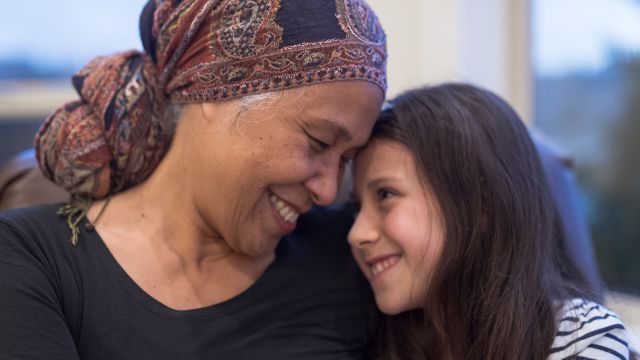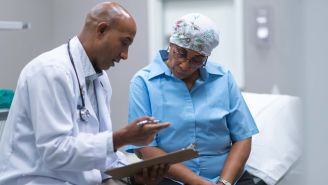Updated on August 5, 2024.
Often, when it comes to breast cancer treatment, the goal for both people with cancer and their healthcare providers (HCPs) is to save as much of the breast as possible, while still ensuring the best outcome possible. This usually means breast-conserving surgery (also referred to as a “lumpectomy-plus-radiation-therapy” or sometimes “lumpectomy” for short). This surgery involves removing the tumor and some surrounding tissue, while sparing most of the breast.
An analysis published in JAMA Surgery in 2022 took an expansive look at breast cancer surgery trends from 2005 through 2017. Researchers found that until 2013, an increasing number of people being treated for breast cancer opted for mastectomy—a bigger surgery that can involve removing the entire breast, nipple, areola, and sometimes lymph nodes.
However, after 2013, this shifted. Since then, more people have been choosing lumpectomy and fewer people have been choosing mastectomy. Here’s what to know about the options for breast surgery and what science says.
Is saving the breast a better bet?
The answer is rapidly evolving as more research is done and surgical techniques and approaches become more targeted. In the past, research has generally indicated that mastectomies and breast-conserving surgery (BCS) are about equally effective treatments for many cases of early-stage breast cancer.
However, a 2022 analysis of 30 reports and 25 studies found that BCS is associated with significantly better survival rates than mastectomy. The review included more than 1.3 million people with breast cancer. It was published in the journal Annals of Surgery.
Research into understanding the reasons behind long-term differences in the outcome of each type of treatment is ongoing. Major hospitals still see both as beneficial and fairly equivalent. The American Cancer Society notes that for people with early-stage cancer, over 20 years of studies have shown that BCS has a similar survival rate as mastectomy.
Some studies since 2022 have continued to find that the two surgeries have about the same outcomes, or that BCS has better outcomes. It’s especially important to note that age, type of cancer, number of tumor areas in the same breast, genetic and family risk, and other factors make a difference for each individual person.
Making the best choice for yourself
Deciding how to treat breast cancer is deeply personal. In general, HCPs will recommend BCS for people with smaller tumors who haven’t already had radiation, and for those who want to save as much of their breasts as possible. Breast-conserving surgery does require five to seven weeks of radiation, and you may have to wait to have reconstructive surgery. However, surgeon Barbara Schwartzberg, MD, of Western Surgical Care in Denver, notes that the majority of people with breast cancer who undergo lumpectomies don't get delayed reconstruction, thanks to newer procedures.
Since more breast tissue remains, the risk of growing another cancer is also slightly higher with lumpectomy.
HCPs generally recommend mastectomies for people with larger tumors, those who have already had radiation, who have multiple tumors in different areas of the breast, or for people with a strong family history or mutations in the BRCA gene. Mastectomies are more convenient in certain ways, because reconstruction can be done at the time of the surgery and is required by federal law to be covered by insurance. However, Medicare and Medicaid may have their own requirements.
The Centers for Disease Control and Prevention (CDC) notes that there is value in getting a second opinion from a different cancer doctor. Since each person with breast cancer has many unique factors that will affect treatment, it can be helpful to get more than one opinion.
Quality of life
Beyond safety, there are other considerations, like quality of life over the long term. Research published in JAMA Surgery in 2022 found that, according to a survey, long-term breast satisfaction and physical well-being were about the same in people who had BCS compared to mastectomies. But people who had the less invasive treatment reported greater satisfaction with sexual and psychosocial well-being.
On the other hand, another survey of people with breast cancer found that mastectomy is linked to fewer experiences of chronic pain and fewer side effects. The results were published in in the journal Cureus in 2021.
Dr. Schwartzberg notes that an additional benefit of a mastectomy may be more peace of mind about recurrence.
“We see patients who were cured of their original cancer with a lumpectomy and whole-breast radiation 20 years ago that are coming back with another cancer,” she says. “They don’t want that constant worry for the rest of their lives.”
On the other hand, recurrence of breast cancer after BCS in patients who had early-stage cancer is rare. When it happens, it can often be treated the same way—with BCS, according to research published in 2022 in the Journal of Clinical Oncology.
With so much information, the decision can be difficult to make. But whichever option you choose, Schwartzberg recommends educating yourself first.
“There are so many options for treatment. It’s important to make sure that you understand not only what you’ve chosen in terms of your surgery, but also how the doctor is going to evaluate you for chemotherapy, endocrine therapy, and what the radiation oncologist can offer you."
Most importantly, she says, "you should take your time in making the decision about what’s right for you.”







